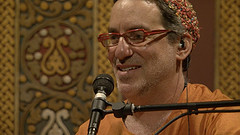Rabbis Without Borders, kirtan, wow
December 17, 2012
Rabbi Brad Hirschfield led a fantastic afternoon session exploring and recontextualizing the statistics Lisa had placed before us. I want to blog about that, at some point. I have a lot of thoughts and ideas bouncing around my head now. I’m thinking a lot about the notion that the rising number of “nones” — those who aren’t affiliated with any religious tradition; who check the “none” box on surveys — is not an ending but a beginning. An opening for a new chapter which we may, if we are awake and aware, be blessed to help co-author.
But the thing I want to write about tonight was our evening program, which was Hebrew kirtan with the Kirtan Rabbi. Kirtan is devotional chanting. In its original context, it’s a kind of bhakti yoga — a devotional practice of chanting divine names in order to open up the heart. Reb Drew led us in an evening of chanting, interspersed with narrative. He told us, over the course of the evening, how he came to explore this form of sacred practice and to integrate it with Judaism.
One of the chants which moved me was a variation on the shema. It features a variety of names for God: not only Adonai and Yah but also hesed, gevurah, tiferet — the classical kabbalistic sefirot. I smiled as those names unfolded. I thought, ah, I see what he’s doing there, that’s very lovely. I enjoyed the chanting, and then when the chant was done I enjoyed the experience of singing the full shema once as our chatimah.
But the chant which really got me was his chant which works with the kaddish. There are several parts to the melody, and we chanted each one in turn. L’eilah min kol birchata u-shirata — beyond all blessings and songs. Y’hei shmei rabbah m’vorach — may the Great Name be blessed. One of the melodic lines is borrowed from the way the kaddish is sung on Friday nights, so I grinned the first time we sang it — a familiar melody and familiar words, shifted and changed by their new context. I was surprised by how much joy and energy we brought to singing that line.
This is hard to describe; I’m not doing it justice. We reached a place where we were singing his kaddish kirtan in harmony — the women singing one melodic line and set of words, the men singing another — and all of a sudden my heart cracked open and I burst into tears. Quietly, mind you; I don’t think most of the room noticed. I covered my face with my hands and took a few deep breaths and then I was able to sing again, though softly. By the time we finished the kaddish my face was wet and all I could think was that this must be what it’s like to be part of the choirs of angels singing holy holy holy back and forth all day.
I’ve been blessed to have this kind of peak experience many times over my years in Jewish Renewal, but I wasn’t expecting to have it tonight. (I’ve heard Reb Zalman speak several times about the challenge of “domesticating” the peak experience — taking the peak experiences we may be blessed to have on retreat, and bringing them home with us, bringing that energy home to enliven our daily prayer lives.) I didn’t see it coming, and there it was: a surprise from God, a moment of intense connection where my heart opened wide and God poured in.
Maybe it was because I was chanting kirtan in such an intimate setting — this RWB cohort is a scant 18 people, so it was an intimate room, all of us seated close together and close to the music. Maybe because everyone in the room knew what the words meant (while I think most kirtan afficionadoes would say that the experience of chanting is meaningful even if the words are opaque — come to think of it, that’s one of the arguments I’ve used for davening in Hebrew even when one isn’t fluent, too — I do think that something is added when one knows what one is praying.)
One way or another, it was wonderful experience. I’m grateful to Reb Drew and his wonderful ensemble (especially Shoshanna Jedwab, whose drumming — when I encounter it — always enlivens my prayer). To my RWB cohort for willingness to enter into this admittedly non-traditional experience (which we’ll be processing and discussing tomorrow morning — that should be fascinating in its own right!) To RWB/Clal for creating the container within which this could all take place.
Several of my colleagues and I took the subway back to our hotel together, still talking about the evening. As I write this post now I feel as though I’m still vibrating faintly from this intense and wonderful day of conversations and connections and song.


Leave a Reply